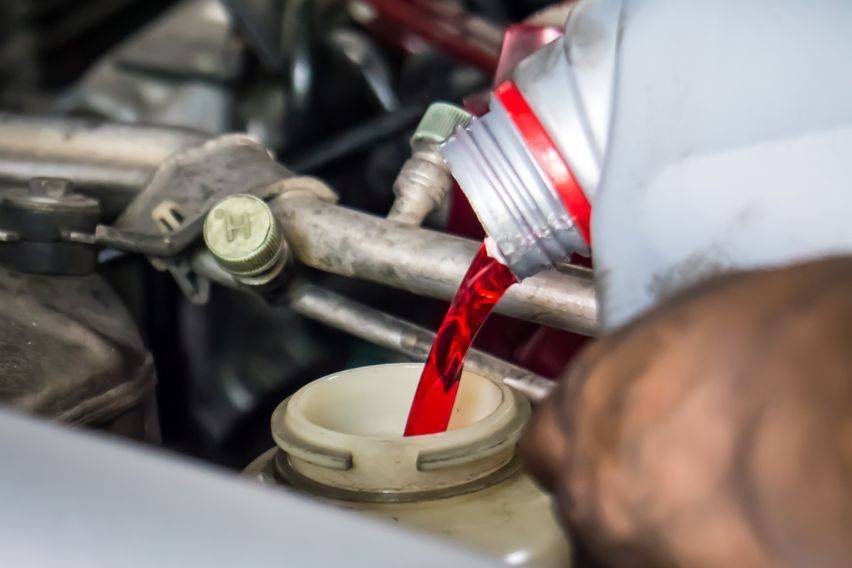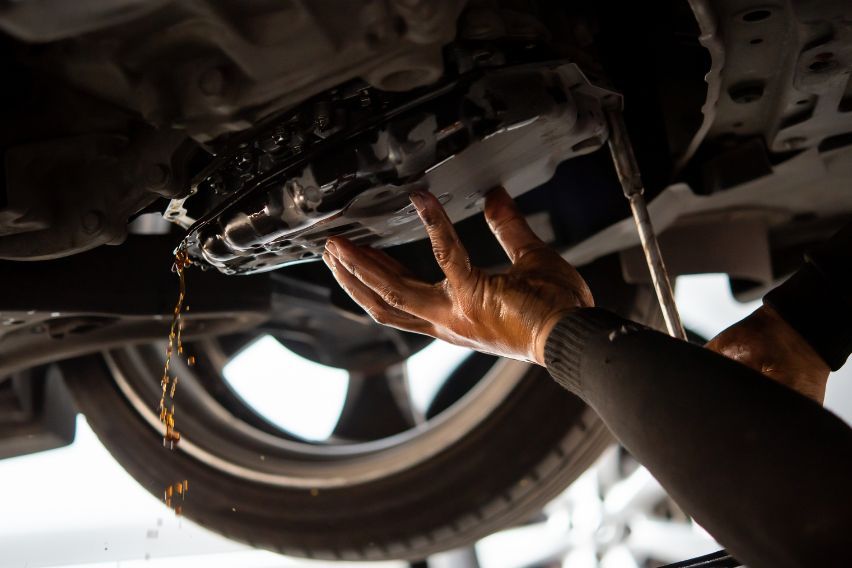Maximizing Transmission Lifespan: How Often Should You Change Your Transmission Fluid?

- KEY TAKEAWAYS
- Importance of transmission fluid maintenance
- Recommended transmission fluid change intervals
- Factors affecting transmission fluid change frequency
- Signs that your transmission fluid needs changing
- DIY transmission fluid change vs. professional servicing
- Benefits of regular transmission fluid maintenance
- Final thoughts
Transmission fluid plays a crucial role in the smooth operation and longevity of your vehicle's transmission system. As a responsible vehicle owner, understanding the proper maintenance of your transmission fluid is essential. Regularly changing the transmission fluid helps to keep the transmission system clean, cool, and properly lubricated. However, determining the ideal frequency for transmission fluid changes can be a perplexing task.
KEY TAKEAWAYS
How often should I change my transmission fluid?
The frequency at which you should change your transmission fluid can vary depending on several factors such as driving conditions, vehicle age, and transmission type. It is generally recommended to follow the guidelines provided by your vehicle manufacturer, but it is also advisable to consider the advice of local mechanics and transmission specialists to determine the ideal change interval.What are the signs that indicate a need for transmission fluid change?
There are several signs that may indicate the need for a transmission fluid change. These include a noticeable decrease in performance or responsiveness, difficulty shifting gears, transmission slipping, unusual noises or vibrations, burnt or discolored fluid, and the presence of leaks or contaminants. If you experience any of these symptoms, it is recommended to have your transmission fluid checked and potentially changed by a professional.We delve into the factors that influence the frequency of transmission fluid changes, signs that indicate when it is time to change the fluid, and the benefits of adhering to a proper maintenance schedule.
Importance of transmission fluid maintenance
While it may not be as glamorous as a brand-new paint job or a shiny set of wheels, transmission fluid plays a vital role in keeping your gears shifting smoothly.

Transmission fluid acts as a lubricant, ensuring that all the moving parts in your transmission can slide and glide without grinding against each other. It also helps to dissipate heat and prevent excessive friction, which can cause wear and tear on your transmission components.
Over time, transmission fluid can become contaminated with dirt, debris, and metal particles from the transmission itself. That is why regular maintenance, including changing the fluid, is crucial to keep your transmission in tip-top shape.
Also read: Don't forget to check your car’s AT and power steering fluids
Recommended transmission fluid change intervals
So, how often should you change your transmission fluid? Well, the answer can vary depending on who you ask.
First, consult the manufacturer. They typically provide guidelines on when to change your transmission fluid in your vehicle's owner's manual. These guidelines are based on various factors like driving conditions, transmission type, and maintenance schedules.

However, according to industry experts, a good rule of thumb is to change your transmission fluid every 50,000 to 90,000 kilometers, or every two to four years. Of course, this can vary depending on your specific driving conditions and habits.
Factors affecting transmission fluid change frequency
First, consider your driving conditions and habits. If you frequently find yourself in stop-and-go traffic or towing heavy loads, your transmission is working harder and may require more frequent fluid changes. On the other hand, if you mostly drive on open highways, your transmission may not need to work as hard, and the fluid can last longer.
Next, take into account your vehicle's age and mileage. Older vehicles may have more wear and tear on their transmissions, requiring more frequent fluid changes. Similarly, if you have racked up a lot of miles on your vehicle, it may be time to refresh the fluid.
Lastly, the type and design of your transmission can impact the change frequency. Some transmissions, like those in certain high-performance vehicles, may require more frequent fluid changes to handle the increased power and stress.
Signs that your transmission fluid needs changing
One telltale sign is if your transmission starts behaving oddly. If you notice rough shifting, slipping gears, or strange noises, it might be time for a fluid change.
Another clue is the appearance of your fluid. If it looks burnt or has a strange color, like a murky brown instead of a nice, vibrant red, it is probably time to swap it out. Burnt or discolored fluid can indicate overheating or contamination, which can wreak havoc on your transmission.

Lastly, keep an eye out for fluid leaks or contaminants. If you spot puddles of fluid under your vehicle or notice bits of debris in the fluid, it is a clear sign that something's amiss and a fluid change may be in order.
Also read: How to diagnose car leaks
DIY transmission fluid change vs. professional servicing
When it comes to changing your transmission fluid, you might be tempted to save some bucks and do it yourself. But before you grab your toolbox, let's weigh the pros and cons of taking on this task solo.
PROS:
- Saving money: DIY transmission fluid change can save you a few pesos compared to professional servicing.
- Flexibility: You can do it on your own time, in your own garage. No need to schedule an appointment or wait in line.
CONS:
- Lack of expertise: Unless you are a transmission guru, you might not have the specialized knowledge needed to identify potential issues or perform a thorough inspection.
- Potential mistakes: One small slip-up during the process could lead to bigger problems down the road, leaving you with an even costlier repair bill.
- Limited equipment: Professional shops have all the fancy tools and equipment designed specifically for transmission fluid changes. Your toolbox might not contain the exact tool you need.
Also read: Need auto fluids? Petron Car Care Center has them all
Now, let's dive into professional transmission fluid servicing. These experts have spent years honing their skills and have all the bells and whistles to get the job done right. Here are some benefits of leaving it to the pros:
- Expertise and experience: Transmission specialists have seen it all and know the ins and outs of your transmission system. They have the knowledge to spot potential issues and fix them before they become major headaches.
- Proper disposal: Handling and disposing of transmission fluid is not a walk in the park. Professionals know how to handle this hazardous material safely, making it an environmentally friendly choice.
- Warranty protection: Many new vehicles come with warranties that require you to follow specific maintenance procedures. By getting professional servicing, you ensure that your warranty remains valid and intact.
Benefits of regular transmission fluid maintenance
Regular transmission fluid maintenance can do wonders for your vehicle's performance and longevity. Think of it as giving your transmission a refreshing spa treatment. Here's how it benefits you:
- Smooth shifting: Fresh transmission fluid keeps the gears in your transmission system running smoothly. This means seamless gear changes and no more awkward jerks or delays when accelerating.
- Reduced friction: Transmission fluid acts as a lubricant, reducing the friction and heat generated by the moving parts inside your transmission. This helps prevent premature wear and tear, extending the lifespan of your transmission.
- Cooler temperatures: Over time, transmission fluid can become contaminated with dirt and debris, causing it to lose its cooling properties. Regular maintenance ensures that your transmission stays cool, preventing overheating and potential damage.
While regular maintenance might seem like an unnecessary expense, it can actually save you a ton of money in the long run. Here's how:
- Avoiding major repairs: By maintaining clean and fresh transmission fluid, you reduce the risk of costly transmission repairs. No one wants to shell out for a pricey transmission rebuild or replacement.
- Improved fuel efficiency: A well-lubricated transmission system operates more efficiently, which translates into better fuel economy.
- Resale value: Keeping up with regular transmission fluid maintenance shows potential buyers that you have taken good care of your vehicle. This can increase its resale value and make it more attractive to potential buyers.
Final thoughts
Remember, maintaining your transmission system is not just about saving money or improving performance; it's about protecting your investment and ensuring your vehicle stays on the road for years to come. Whether you prefer the DIY route or opt for professional servicing, make sure you give your transmission the love and care it deserves.
Photos from File, Roy Robles, and Prestone Philippines
Sell your car at the best price
 Verified and genuine buyers
Verified and genuine buyers
Trending & Fresh Updates
- Latest
- Popular
You might also be interested in
- News
- Featured Stories
Featured Cars
- Latest
- Upcoming
- Popular
Car Articles From Carmudi
- journal
- advice
- financing
- insurance



















































































